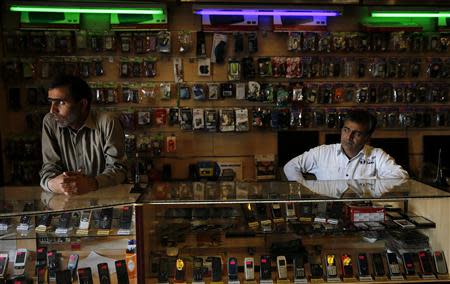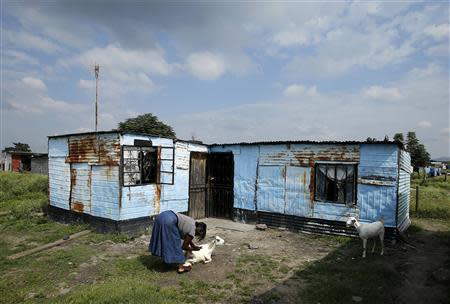Ghost towns haunt South Africa's strike-hit platinum belt
By Zandi Shabalala and John Mkhize MARIKANA, South Africa (Reuters) - Shad Mohammed's electronics and household store in South Africa's platinum belt has survived a series of mining strikes over the 14 years it has been serving customers in the dusty town of Marikana. Yet with the latest stoppage now in its 10th week, he has sold just 10 phones instead of well over 100, and has had to branch out into deliveries to avoid giving up and going home to Pakistan, another statistic in a devastating industrial dispute. "Our business is totally dependent on the mine workers," Mohammed, 38, said among shelves filled with cell phones, laptops and large pots. "If they don't work we really suffer." Members of the Association of Mineworkers and Construction Union (AMCU) have downed tools at Lonmin, the main employer in the tough town of Marikana, and rivals Anglo American Platinum and Impala Platinum in a strike over wages, hitting 40 percent of global production. The stoppage shows no sides of ending with the two sides still poles apart. AMCU wants a basic-entry level wage in three years of 12,500 rand (723 pounds) a month, or annual hikes of around 30 percent, while the companies have offered increases of up to 9 percent and say they can afford no more. The strike, the biggest in South Africa's mines in living memory, has so far cost companies and workers a collective 17 billion rand in revenue and wages, according to a tally updated constantly on an industry website. http://www.platinumwagenegotiations.co.za/home The central bank said last week the continuing stoppage was a key threat to economic growth, now forecast at 2.6 percent in 2014 instead of 2.8 percent. Exports from Africa's largest economy and its rand currency are also vulnerable. Lonmin chief executive Ben Magara said on Thursday that collectively the industry was spending 67 million rand a day less than usual on goods and services, mostly in the local economies on the platinum belt northwest of Johannesburg. All three companies have said they have declared force majeure with some of their suppliers and contractors, a legal term which allows companies to suspend payments and deliveries because of circumstances beyond their control. GHOST TOWN This has transformed bustling and crowded mining towns into ghost town-like skeletons of their former selves. The narrow muddy roads in Nkaneng, Marikana's informal settlement, are dotted with small groups of men standing in circles, some wearing blue work trousers and green AMCU t-shirts. Daniel Waza, a convenience store or "spaza shop" owner, sits on empty brown boxes in the middle of his small shop where fresh fruits and vegetables used to be. "You can't even sell any fresh food anymore, there is no one to buy your food, the people have gone home ... some people have no money," he said. By home he meant rural villages hundreds of kilometres away in areas such as the Eastern Cape province, where over a third of Lonmin's workers hail from. Others come from neighbouring countries such as Lesotho and Mozambique. Bob Ndude, an AMCU shop steward at Lonmin, said about half the miners on strike were sitting it out in their rural homes. Kagiso Masiangwako, a manager at the Marikana branch of Johannesburg-listed credit furniture shop Lewis, said fewer people were frequenting the town's single main street. "Our bosses say we are not working, but there is nothing happening here," he said. In a January trading update, the group said "trading conditions remained challenging with labour instability across many sectors." Lewis sells most of its furniture on credit and its Marikana unit has had few monthly payments made as a result of the strike, with no new sales since it started on January 23. Masiangwako gestured at piles of papers on his desk listing customers who had repeatedly missed payments. He said while some attempt to make payments, others leave town and never return the furniture or finish paying it off. In the nearby town of Rustenburg, a prostitute, who declined to be named, told Reuters "business is too slow" as a result of the strike. Even her regular customers did not come as often as they used to, she said, before hurrying off into the night. RISING CRIME Three spaza shop owners in the township told Reuters they could no longer afford rent and would consider moving to Johannesburg if the strike continued for much longer. Many spaza shops allow residents to take some food items such as bread and maize meal on credit. "Since we don't have rands, we have to take care of the cents," said salon and food store owner Maria Marumong. Marumong rents a shipping container across from Mohammed's electronics shop. The container is divided in half by a long brown board, with women's hair extensions and pictures of America pop stars' hairstyles hanging on one side and the smell of maize meal and sausages drifting in from the other. "If I give up now it's going to be hard to start again," she said. Mohammed's new delivery business just covers the 10,000 rand monthly rent and school fees for his children in Pakistan but he has been hit by rising crime. "Crime is really bad in this area now," he said, pointing to a hole in the ceiling where a thief came in recently. "We saw the footage ... in 45 seconds, he took eight laptops and climbed out the roof." Miners have had no income as the mining system works on a no-work no-pay principle, leaving many destitute. (Additional reporting by Ed Stoddard; editing by Philippa Fletcher)

 Yahoo News
Yahoo News 

